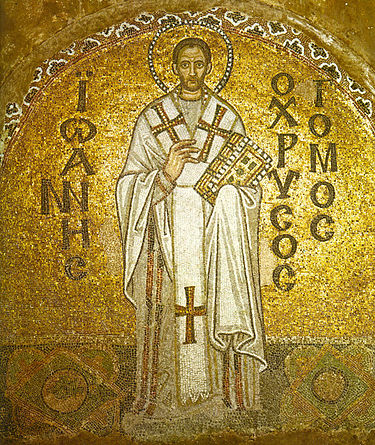
Archbishop of Constantinople
Teacher of the Faith
John Chrysostom was the patriarch of Constantinople in the late 4th century. He became so renowned for his preaching that he was later named “the golden-mouthed” (Chrysostom). He grew up familiar with the sophistication of educated city life, but showed an interest in theology from an early age. After his baptism he was greatly attracted by the ascetic ideal. Popular religious heroes were those who engaged in the rigorous discipline of the monastic life, striving for the ideal through personal self-denial in the desert. John found this attractive, but was also drawn to serious biblical studies, for which Antioch was famous. He spent a year or two in the Syrian desert, but in 381 returned to Antioch and was ordained.
John's fame as a preacher grew and his sermons were noted down for publication. His primary interest was in encouraging his hearers to purer discipleship and commitment, he gave himself wholeheartedly to this task. I cannot let a day pass without feeding you with the treasures of the Scriptures,
he told his hearers. His principal themes were morality and the need for Christian action. He didn’t just talk the talk, he walked the walk, working among the poor and destitute in
Antioch.
Imperial aides engineered his election as patriarch of Constantinople in 398, hoping he could end the incessant ecclesiastical bickering in the imperial city. But his crusading moral zeal, gained him enemies among the upper-class and jealousy of his preaching talent, made enemies in the Church.
Finally, the empress
Eudoxia took personal umbrage at a sermon by John on
Jezebel
, and his enemies succeeded in having him exiled to
Cucusus in
Roman Armenia. He wrote so many letters from there, that in 407 he was sent further away to the
Black Sea coast. The strain of the journey on foot was too much for him and he died en route, his last words being, “Glory to God for everything.”
BORN: c.349, Antioch
DIED: 14 September 407, Comana in Pontus
 Welcome
Welcome Calendar
Calendar Today's Word
Today's Word Lauds
Lauds Terce
Terce Sext
Sext None
None Vespers
Vespers Compline
Compline Matins
Matins